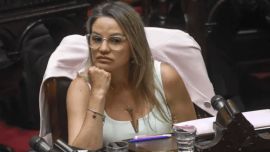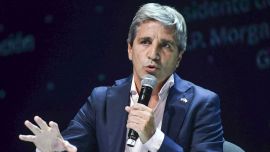THE WEEK IN CORONAVIRUS
There were 4,512,439 confirmed cases of coronavirus contagion and 95,382 deaths at press time yesterday as against 4,374,763 cases and 91,979 deaths the previous Friday. Last Sunday President Alberto Fernández headed a ceremony in the Kirchner Cultural Centre to honour the then 92,000-plus victims of Covid-19 and the next day he cancelled his flight to the Generation Equality Forum in Paris in view of the new travel restrictions facing his compatriots. From the start of the week up to 45,000 people began to be stranded abroad with daily entries into Ezeiza Airport capped at 600 and dozens of flights cancelled. On Tuesday evening 709,000 doses of Sputnik V vaccine (including 350,000 of the second shot) arrived at Ezeiza International Airport, thus bringing total vaccine deliveries close to 25 million, while earlier that day Laboratorios Richmond president Marcelo Figueras said that his plant would be producing 150,000 doses of the same shot as from next Monday with a total of almost a million of both vaccines in the pipeline. Also on Tuesday Buenos Aires Governor Axel Kicillof announced that all persons travelling in July would have to spend four days isolated in a hotel at their own expense upon their return from abroad in a total quarantine of a week. He also opened up vaccination to everybody over 50, as well as all priority groups (health workers, the security forces and teachers irrespective of age and all aged over 18 with additional health risks). Kicillof complained that 30-40 percent of returnees were not complying with quarantine, thus increasing the risk of Delta variant entry, while his Cabinet Chief Carlos Bianco added that violators would be fined over four million pesos as from last Thursday. At press time, the president was signing an emergency decree removing obstacles that prevent the purchasing of vaccines produced by Pfizer, Moderna and Johnson & Johnson.
MACRI FLIES OFF AMID FURORE
Ex-president Mauricio Macri travelled to Europe last weekend (an increasingly rare privilege in recent days) to showcase his book Primer Tiempo and enjoy a month’s holidays in the Northern Hemisphere summer but not without controversy – although testing negative upon departure at Ezeiza Airport, he had previously met with deputy Juan Manuel López (the caucus chief of the Civic Coalition wing of the opposition Juntos por el Cambio alliance) who has tested positive for Covid-19. Other participants at the meeting went into preventive isolation but Macri’s entourage insisted that they had met in a ventilated room while respecting social distancing. Immigration Department chief Florencia Carignano did not rule out denouncing Macri for violating quarantine upon his return. "Macri lacks respect for this disease and its victims and has been ignoring the pandemic from day one,” the official said, while avoiding comment on thousands of travellers stranded abroad by the latest restrictions to keep the Delta variant at bay beyond speaking of “inconveniences for some Argentines” and saying that nobody obliged them to fly abroad.
HIDROVIA TAKEOVER
The government nationalised the administration of the Hidrovía Paraná-Paraguay last Thursday via Decree 427/2021 assigning the tasks of its maintenance (including dredging) to the Administración General de Puertos (AGP) port authority for at least 12 months. The waterway accounts for 80-85 percent of Argentine foreign trade. The farming sector was quick to criticise the move with former Agriculture Minister Luis Miguel Etchevehere describing its main motive as "to steal the money," referring to the waterway tolls of US$300 million which now accrue to the state.
JUJUY ELECTIONS
In local provincial assembly and municipal elections last Sunday, Jujuy Radical Governor Gerardo Morales notched up a crushing win over the nationally ruling Frente de Todos with his Cambia Jujuy list winning almost 42 percent of the vote to a mere 13 percent for Frente de Todos and little over quarter of the vote with its Peronist and other allies (including 4.9 percent for a list backing jailed social activist Milagro Salas). Third place went to the leftist Frente de Izquierda with 7.7 percent but a low turnout below two-thirds of the 570,000 voters with around a quarter of those who did vote spurning all national parties points to widespread disenchantment.
MARKET WATCH
The “blue” dollar, the main parallel exchange rate, closed the week at 170 pesos, up a couple of pesos from midweek after slipping down to 168 from the previous Friday’s close of 174 pesos in the wake of MSCI credit rating agency downgrading Argentina to sub-frontier status. The official exchange rate inched up to 100.75 pesos from 100.50 as quoted by Banco Nación or 166.25 pesos with the 65 percent surcharges for purchasers, well below the “blue.” Among the unofficial but legal alternative exchange rates, the CCL (contado con liquidación) climbed to 166.40 pesos from 165 pesos the previous Friday while the MEP (mercado electrónico de pagos) rose from 163.50 to 166.35 pesos in the course of the week. Country risk, which had approximated the 1,600 mark in the wake of the MSCI downgrading, continually brushed that level in the course of the week but closed yesterday at 1,588 points.
ECONOMIC FALLOFF
Economic activity was down 1.2 percent last April from the previous month as a consequence of the new restrictions applied to counter the second wave of coronavirus, INDEC statistics bureau reported last Tuesday, although powerfully up by 28.3 percent from the same month last year (when lockdown was most completely enforced) with a rebound of 221.5 percent for the construction sector and 207.7 percent for hotels and restaurants. The economy has thus slumped every month since last January although the first four months of this year register 8.2 percent growth as against the first third of 2020. The business sector blamed up to 15 percent absenteeism due to contagion and quarantine for the fall in production, especially in labour-intensive industries.
SOCIALIST MILESTONE
Argentina’s Socialist Party marked 125 years of existence last Monday. Founded in Monserrat in 1896 by some 50 activists (all male) under the leadership of Juan B. Justo and the conceptual guidance of the newspaper La Vanguardia, it crystallised several largely immigrant leftist groupings speaking various languages which had arisen in the previous quarter-century while distancing itself from the anarchists (also a powerful force in those times) by attaching importance to parliamentary action, pushing for universal suffrage.
BULLRICH WON'T RUN IN CITY
PRO party leader Patricia Bullrich will not run for office as a national deputy representing the City of Buenos Aires, averting a high-profile face-off with fellow opposition politician, ex-Buenos Aires Province governor María Eugenia Vidal.


















Comments